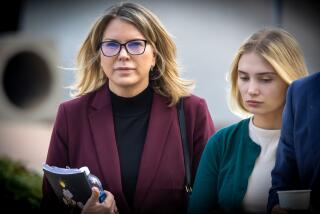Steroid News Outweighed Jury Harm, Paper Argues
- Share via
SAN FRANCISCO — Attorneys for two reporters, who face jail if they refuse to reveal who gave them secret testimony on the use of steroids by star athletes, argued Friday that hamstringing the press’ ability to gather news would harm the public interest more than the leak did.
The San Francisco Chronicle reporters, Mark Fainaru-Wada, 41, and Lance Williams, 56, were subpoenaed to a federal grand jury in May to reveal who provided the testimony of baseball stars Barry Bonds, Jason Giambi and Gary Sheffield in the federal probe of the Bay Area Laboratory Co-Operative (BALCO).
The reporters’ attorneys immediately sought to quash the subpoenas. U.S. District Judge Jeffrey S. White heard arguments from both sides Friday.
Prosecutors contend that the leak in 2004 seriously breached grand jury secrecy and could hinder their ability to get reliable testimony in future criminal probes.
Greg Anderson, Bonds’ personal trainer, has cited the leaks as a reason he has refused to testify to a new grand jury -- for which he was jailed last month.
Prosecutors are also investigating perjury and obstruction-of-justice allegations, because all the people known to have had access to the leaked material have signed sworn declarations that they were not the source.
The Chronicle’s attorneys downplayed the breach. They urged the judge to balance it against the need of the press to use confidential sources to fulfill its news-gathering role -- and specifically the public service that the Chronicle’s series on steroid use provided.
The Chronicle’s stories on the BALCO probe sparked a national debate, pushed Major League Baseball to impose punishments and earned praise from President Bush, attorneys said.
“This reporting put a name and a face on a very abstract concern,” said Chronicle attorney Jonathan Donnellan. “Before these articles came out, Congress was not moving on the issue of steroid abuse in Major League Baseball.”
There is no federal law protecting journalists from being compelled to reveal their sources, nor has the U.S. Supreme Court given them such a shield under the 1st Amendment.
The only time the high court addressed the issue specifically was 34 years ago in Branzburg vs. Hayes, when it upheld contempt convictions for reporters who had failed to appear before grand juries.
An appeals panel in Washington, D.C., last year used the Branzburg ruling to uphold contempt charges against New York Times reporter Judith Miller and Time magazine reporter Matthew Cooper. But the Branzburg case left enough latitude that the issue is far from settled.
In his oft-cited concurring opinion in 1972, Justice Lewis Powell wrote there must be a “proper balance between freedom of the press and the obligation of all citizens to give relevant testimony with respect to criminal conduct.”
Media attorneys routinely advocate such a balancing. Donnellan argued Friday that appellate court decisions since Branzburg have established a common-law privilege for reporters to protect their sources in all but the most extraordinary circumstances, such as threats to national security.
He cited the Department of Justice’s own manual, which calls for subpoenas of the press only “where immediate action is required to avoid the loss of life or compromise of a security interest.”
Donnellan said the leak in the BALCO case did not harm the government’s probe into the firm’s steroid distribution.
But the judge repeatedly questioned how the leak could be insignificant.
“Perjury, breach of the grand jury, obstruction of justice,” White said. “How can you say this is not serious?”
White is expected to issue his ruling sometime this month.
“If the court decides this is worthy of sending us to jail, that’s what’s going to happen,” Fainaru-Wada said.
More to Read
Go beyond the scoreboard
Get the latest on L.A.'s teams in the daily Sports Report newsletter.
You may occasionally receive promotional content from the Los Angeles Times.











